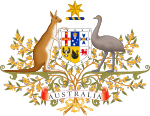Department of Communications (2013–2015)
 | |
| Department overview | |
|---|---|
| Formed | 18 September 2013[1] |
| Preceding Department | |
| Dissolved | 21 September 2015 |
| Superseding Department | |
| Jurisdiction | Commonwealth of Australia |
| Headquarters | Canberra |
| Employees | 495 (30 June 2014) |
| Annual budget | A$113.190 million (2012/2013) |
| Ministers responsible |
|
| Department executive |
|
| Website | www |
The Australian Government Department of Communications was a department responsible for helping to develop a vibrant, sustainable and internationally competitive broadband, broadcasting and communications sector in Australia and promoting the digital economy.[2]
The head of the department was the Secretary of the Department of Communications, Drew Clarke, who reported to Malcolm Turnbull, then the Minister for Communications.
History
[edit]The Department of Communications replaced the Department of Broadband, Communications and the Digital Economy (DBCDE) in September 2013 after the Liberal-National Coalition won the 2013 election.
In September 2015, the department was dissolved and replaced by the Department of Communications and the Arts.
Preceding departments
[edit]- Postmaster-General's Department (1 January 1901 – 22 December 1975)
- Department of the Media (19 December 1972 – 22 December 1975)
- Postal and Telecommunications Department (22 December 1975 – 3 November 1980)
- Department of Communications (3 November 1980 – 24 July 1987)
- Department of Transport and Communications (24 July 1987 – 23 December 1993)
- Department of Communications (23 December 1993 – 30 January 1994)
- Department of Communications and the Arts (30 January 1994 – 21 October 1998)
- Department of Communications, Information Technology and the Arts (21 October 1998 – 3 December 2007)
- Department of Broadband, Communications and the Digital Economy (3 December 2007 – 18 September 2013)
Operational functions
[edit]The Administrative Arrangements Order made on 18 September 2013 detailed the following responsibilities to the department:[3]
- Broadband policy and programs
- Postal and telecommunications policies and programs
- Spectrum policy management
- Broadcasting policy
- National policy issues relating to the digital economy
- Content policy relating to the information economy
References
[edit]- ^ CA 9429: Department of Communications [III], Central Office, National Archives of Australia, retrieved 9 April 2014
- ^ "Corporate Plan 2011-13". About us. Commonwealth of Australia. 3 October 2013. Archived from the original on 29 September 2013. Retrieved 27 October 2013.
- ^ "Administrative Arrangements Order" (PDF). Department of the Prime Minister and Cabinet. Commonwealth of Australia. 18 September 2013. Archived from the original (PDF) on 14 October 2013. Retrieved 27 October 2013.
